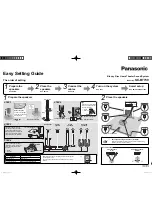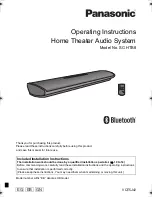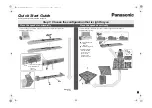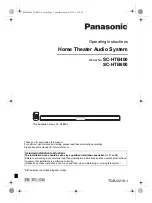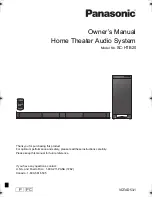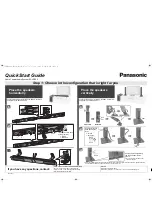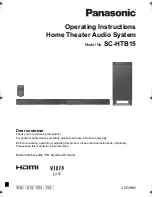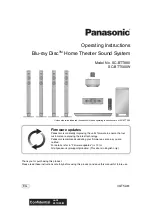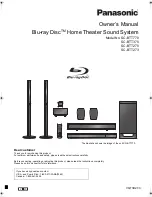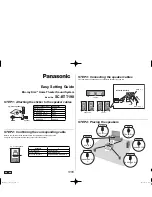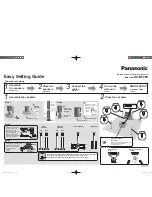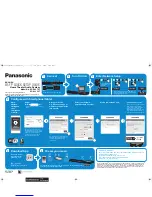
9
Owner’s Manual
Owner’
s Manual
Removing the low-frequency content also allows
you to raise the overall output level somewhat. Low-
frequency information requires the largest amount of
an amplifier’s output, so restricting the low-frequency
content allows raising the mid-frequency level
somewhat. If your client insists on mixing LOUD, this
may be a workable strategy.
5. HIGH FREQ FILTER
INPUT
SENSITIVITY
–10dB
NORMAL
OFF
ACOUSTIC
SPACE
LOW
FREQ FILTER
POWER
MODE
0
(NORMAL)
AUTO
ON
–2dB
+2dB STANDBY
ON
HIGH
FREQ FILTER
HALF
WHOLE (NORMAL)
QUARTER
80Hz
LOW CUT
49Hz
(NORMAL)
B
A
C
THX = 0 dB
The HIGH FREQ FILTER switch tailors the overall
high-frequency response by ±2 dB beginning at 10kHz.
Leave this switch in the 0 (NORMAL) position unless:
• You want to subtly brighten or darken the sound of the
speakers.
• Perhaps you have hearing loss caused by too many
nights in front of a double Marshall stack.
• You just like to mix on the bright side or dull side.
If your mixes consistently sound dull or dark when
you listen elsewhere, this usually indicates that your
monitors are too bright, relative to your normal hearing.
A bit less high-frequency energy usually fixes this, and
you can force the mix in this direction by reducing the
high-frequency output of the monitors by using the –2 dB
position of the switch.
4. LOW FREQ FILTER
INPUT
SENSITIVITY
–10dB
NORMAL
OFF
ACOUSTIC
SPACE
LOW
FREQ FILTER
POWER
MODE
0
(NORMAL)
AUTO
ON
–2dB
+2dB STANDBY
ON
HIGH
FREQ FILTER
HALF
WHOLE (NORMAL)
QUARTER
80Hz
LOW CUT
49Hz
(NORMAL)
B
A
C
THX = 80Hz
The LOW FREQ FILTER switch inserts a
low-frequency rolloff into the response curve.
• For some applications, the low-frequency output of
the HR624 MK2 may impair your ability to make mix
judgements.
• For THX applications, use the 80Hz setting.
• For non-THX applications where a sub-woofer isn’t
enhancing low-frequency output use the 49Hz
(NORMAL) position.
• The LOW FREQ switch affects the low-frequency
content of your mix. Remember how things work in
reverse, so removing the deep bass content on playback
may actually increase it in the final mix.
• You can use the LOW FREQ switch’s 80Hz position to
simulate a smaller loudspeaker, especially one with
limited low-frequency capability (like a certain popular
2-way nearfield monitor). You may need to do this if a
small speaker is the eventual destination of your mix,
or perhaps just to see how your mix sounds on a clock
radio.
ACOUSTIC SPACE
0
dB
–
2
dB
–
3
dB
–
4
dB
20
100Hz
LOW FREQ
LOW CUT
80Hz
HIGH FREQ
0
dB
–
2
dB
10kHz
+
2
dB
ACOUSTIC SPACE APPLICATIONS
SPEAKERS AGAINST WALL
SPEAKERS IN CORNERS
CONSOLE
CONSOLE
HALF SPACE
QUARTER SPACE
49Hz
SPEAKERS AWAY
FROM WALLS
CONSOLE
WHOLE SPACE
0
dB
INPUT
SENSITIVITY
–10dB
NORMAL
OFF
ACOUSTIC
SPACE
LOW
FREQ FILTER
POWER
MODE
0
(NORMAL)
AUTO
ON
–2dB
+2dB STANDBY
ON
HIGH
FREQ FILTER
HALF
WHOLE (NORMAL)
QUARTER
80Hz
LOW CUT
49Hz
(NORMAL)
B
A
C
MAINS INPUT
SIGNAL INPUTS BAL/UNBAL
XLR
PHONE
RCA
C
B
A
RISK OF ELECTRIC SHOCK
DO NOT OPEN
WARNING:
TO REDUCE THE RISK OF FIRE OR ELECTRIC SHOCK, DO NOT
EXPOSE THIS EQUIPMENT TO RAIN OR MOISTURE. DO NOT REMOVE COVER.
NO USER SERVICEABLE PARTS INSIDE. REFER SERVICING TO QUALIFIED PERSONNEL.
AVIS:
RISQUE DE CHOC ELECTRIQUE — NE PAS OUVRIR





















